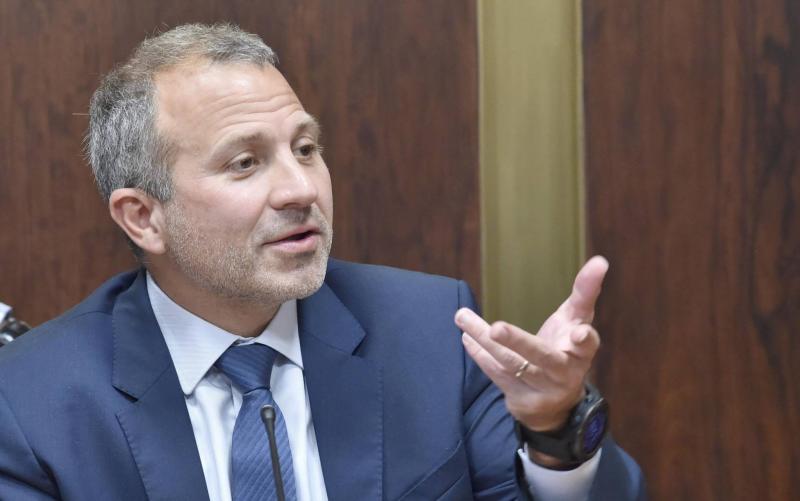The open political clash between the Lebanese Minister of Defense in the caretaker government, retired Brigadier General Maurice Slim, representing former President Michel Aoun, and the head of the "Free Patriotic Movement," MP Gibran Bassil, against Army Commander General Joseph Aoun, would not have been possible if it weren't for the candidacy of Aoun for the presidency, which is supported regionally and internationally, placing him among the contenders. Therefore, the ongoing battle between them, as a prominent political source tells "Asharq Al-Awsat," will not cease until the presidential elections are completed—either Aoun will be elected president, or he will leave his position so that someone endorsed by the new president can take charge of the military institution.
The political source points out that the escalating conflict between the Army Commander and Minister Slim seems impossible to contain, even though its ramifications have not yet affected the military institution's management, which continues to perform its tasks alongside security forces to maintain security and protect civil peace, while Lebanon teeters on the brink of comprehensive collapse under the weight of accumulated crises and soaring poverty, which has reached its peak amid the absence of measures to curb it.
The source questions whether the open war between General Aoun and Minister Slim, on behalf of MP Bassil and former President Aoun—who accused the Army Commander of organizing a coup against him by failing to confront those who rebelled on October 17, 2019—justifies constraining the military institution to take revenge on the person at its helm, who is currently carrying out business in the absence of a military council that cannot convene due to the loss of quorum after three of its members were retired.
The same source emphasizes that the problem is not personal between General Aoun and Minister Slim but goes beyond that to an open war instigated by President Aoun and Bassil. He states that focusing on the financial aspects related to the military institution aims to undermine the Army Commander's image in the international community to push him to change his opinion, although his opponents realize that distorting his reputation domestically or internationally is nearly impossible.
It is revealed that the team supporting the candidacy of former MP Sleiman Frangieh for the presidency bets that Bassil may be forced to withdraw his objection to his candidacy if he finds Aoun's chances surpassing those of other candidates.
The source also suggests that the war against the Army Commander did not explode publicly due to Slim's refusal to postpone the retirement of Chief of Staff General Amin Aram, the Army's management director General Malik Shams, and Inspector General General Milad Iskhaq; rather, it began to be prepared in the early days of the uprising that coincided with Aoun's displeasure with the military institution's behavior in refusing to excessively use force to suppress the protesters.
It is pointed out that Slim avoided confrontation with the "Shia duo" by agreeing to sign a decision appointing Brigadier General Munir Shahada to manage the general administration's affairs and needs, while he refrained from signing a decision based on the Army Commander's directives appointing Brigadier General Jreiss Al-Malhem to oversee the affairs of the Inspector General instead of the general proposed by the Minister of Defense, even though the former is senior in rank compared to the latter.
The disagreement soon became apparent when the Army Commander initiated to put Malhem Hadad in a caretaker role, which forced Slim to appoint a colonel to handle the Inspector General's affairs, even though the officer proposed by General Aoun works alongside the colonel appointed by Slim under the pretext that the Inspectorate reports directly to him. However, General Aoun quickly issued a memorandum allowing holders of a "Pass Facilitation" card to carry weapons, which angered the Minister of Defense after the memo was circulated to all other security and military institutions, citing that the cards permitting holders to carry weapons are personally signed by him, unlike the memo signed by the Army's intelligence chief on behalf of the Army Commander.
This open war also led to the reduction of guards around the Minister of Defense's residence in Sanayel and the streets leading to it, noting that their presence is unprecedented and had caused objections from some residents living in the vicinity of his home or nearby.
Moreover, the military court almost stopped working from the first day of this month had it not been for Slim signing, according to the political source, a decision to extend the members of the reserve prosecutorial authority as a substitute for the inability to form the original prosecutorial authority due to Slim's refusal to sign a decision appointing Colonel Khalil Jaber as the original president of the military court. "Asharq Al-Awsat" learned that Slim refused to sign this decision on the grounds that the appointment falls under his jurisdiction, while he avoided withholding the salaries of volunteers in the military institution, as doing so would negatively impact him. The same reasoning applied to his signing of the general administration's needs within the army, directly related to food provision and medical care, especially since he had previously managed military medical services.




